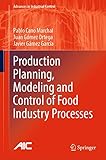Production planning, modeling and control of food industry processes / Pablo Cano Marchal, Juan Gómez Ortega, and Javier Gámez García.
Material type: TextSeries: Advances in Industrial ControlPublisher: Cham : Springer International Publishing : Imprint: Springer, 2019Edition: 1st ed. 2019Description: 1 online resource (XIII, 202 pages 74 illustrations, 53 illustrations in color.)Content type:
TextSeries: Advances in Industrial ControlPublisher: Cham : Springer International Publishing : Imprint: Springer, 2019Edition: 1st ed. 2019Description: 1 online resource (XIII, 202 pages 74 illustrations, 53 illustrations in color.)Content type: - text
- computer
- online resource
- 9783030013738
- 629.8 23
| Item type | Current library | Call number | Status | Date due | Barcode | |
|---|---|---|---|---|---|---|
| E-Resources | Main Library E-Resources | 629.8 C227 (Browse shelf(Opens below)) | Available | E003765 |
Chapter 1. Introduction -- Chapter 2. Modeling and System Identification -- Chapter 3. Control of Lower-level Dynamic Layers -- Chapter 4. Control of Higher-level Dynamic Layers -- Chapter 5. Production Planning for Food Transformation Processes. Chapter 6. Case Study: Virgin Olive Oil Production Process -- Chapter 7. Conclusions and Future Directions.
This book provides a new approach to the control of food transformation processes, emphasizing the advantage of considering the system as a multivariable one, and taking a holistic approach to the decision-making process in the plant, considering not only the technical but also the economic implications of these decisions. In addition, it presents a hierarchical structure for the global control of the plant, and includes appropriate techniques for each of the control layers. The book addresses the challenges of modeling food transformation processes, using both traditional system-identification techniques and, where these prove impractical, models based on expert knowledge and using fuzzy systems. The construction of optimal controllers for each of these types of models is also discussed, as a means to close a feedback loop on the higher-level outputs of the process. Finally, the problem of production planning is covered from two standpoints: the traditional batch-sizing problem, and the planning of production throughout the season. Systematic season-wide production planning is built upon the models constructed for the control of the plant, and incorporates market- and business-specific information. Examples based on the processing of various foodstuffs help to illustrate the text throughout, while the book's closing chapter presents a case study on advances in the processing of olive oil. Given its scope, the book will primarily be of interest to two groups of readers: food engineering practitioners and students, who are familiar with the characteristics of food processes but have little or no background in control engineering; and control engineering researchers, students and practitioners, whose situation is just the opposite, and who wish to learn more about food engineering and its specific challenges for control. Advances in Industrial Control reports and encourages the transfer of technology in control engineering. The rapid development of control technology has an impact on all areas of the control discipline. The series offers an opportunity for researchers to present an extended exposition of new work in all aspects of industrial control.
Description based on publisher-supplied MARC data.
There are no comments on this title.

